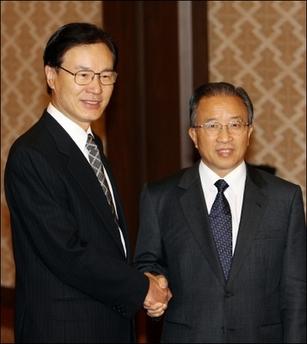 Komura and JiechiLast week, Masahiko Komura, the Foreign Minister of Japan, made a visit to Beijing to discuss issues relating to demarcation disputes in the East China Sea. According to the headline of the left-wing Asahi Shimbun, “Japan-China gas field issue nears resolution” although the “two sides remain split over the demarcation.” The Yomiuri Shinbum reports in its editorial “To all appearances, Japan and China have taken a first step toward crafting a strategic, mutually beneficial relationship.”
Komura and JiechiLast week, Masahiko Komura, the Foreign Minister of Japan, made a visit to Beijing to discuss issues relating to demarcation disputes in the East China Sea. According to the headline of the left-wing Asahi Shimbun, “Japan-China gas field issue nears resolution” although the “two sides remain split over the demarcation.” The Yomiuri Shinbum reports in its editorial “To all appearances, Japan and China have taken a first step toward crafting a strategic, mutually beneficial relationship.”
Attempting to see how the Chinese news reported this issue, it was surprising to see the little coverage there is on the most recent visit by Japan. Looking through People’s Daily online, and ChinaDaily.com, both articles have brief, newswire style reports merely saying “China and Japan share common understanding on maintaining and enhancing high-level visits and exchanges.” The state news agency, Xinhua, did not have any up-to-date reports on this visit.
The Japanese newspapers look quite positive in their outlook for Sino-Japanese relations whereas the Chinese newspapers just report the facts without much comment.
With Japan so scared of China’s growing power, are the newspapers a reflection of Japan’s desperation to improve relations and China’s cautiousness over what the future brings?
Blog:
Other posts by Anna:






Comments
Garrett DeOrio (not verified)
December 5, 2007 - 21:44
Permalink
Papers reflect their governments
Ms. Kitanaka, to take a stab at your headline question: Of course. If the Government of Japan wants to improve relations, it's a foregone conclusion that newspaper reports will reflect that.
While you, and others, refer to the Asahi as "left-wing," it, just like the Yomiuri, just like the Sankei, just like all other mainstream news outlets, is a member of the press club system, which means that the news they print is whatever the kantei or gaimusho would like them to print, or at least approves.
In the major dailies, the departure from this pattern can be seen in the Asahi's editorial page, although not so often in the Yomiuri's.
(As an aside, it's interesting that you label the Asahi "left-wing" without calling the Yomiuri "right-wing," especially when, by most standards, both papers are at least centrist, if not right of center. Criticizing the LDP in editorials doesn't exactly make a paper lefty.)
On the Chinese side, the question need not even be asked. Both the People's Daily and ChinaDaily are state-run.
The question should be to what extent Japan does fear China's growing power and how much greater that fear is on the Japanese side than the Chinese side. After all, at this point, a souring in the relationship would have economic consequences for China at least as severe as those for Japan and Japan is still vastly more economically powerful than China, if only slightly militarily so.
Anna
December 6, 2007 - 15:54
Permalink
Dear Garrett
Thank you for your comment. Indeed, the question you ask is a very interesting one and one that I would very much like to find the answer to.
Regarding the newspapers, of course the Chinese newspapers are state run. But what interested me was seeing how Japan seem more positive about the future of Sino-Japanese bilateral relations. If, as you say, the press are a mouthpiece for the government, then the question you ask about "to what extent Japan does fear China's growing power and how much greater that fear is on the Japanese side than the Chinese side," perhaps the simplest of answers is "Japan fears China more than China fears Japan?"
But then again, the simplest of answers can't answer such a complex question such as this.
Ken (not verified)
December 6, 2007 - 21:46
Permalink
I tend to worry about using
I tend to worry about using terms such as 'right wing' and 'left wing' in reference to Japanese news sources, since they are so loaded with significance to western ideas.
It seems to me that calling the Asahi 'left-wing' makes it sound like some form of the Workers' International, when the Asahi is infamous for its union-busting techniques. On the flip side, calling the Yomiuri 'right wing' makes little sense when the 'right wing' is group of a few thousand loonies driving around in sound trucks, essentially marginalized from the mainstream political process.
With regards to this issue in the post, it helps to remember just how much Mr Watanabe, the President of the Yomiuri, grew to loathe Mr Koizumi when he was Prime Minister, even refusing to refer to him by name (あの方) on occasion. The big reason for the beef: Mr Koizumi allowed relations with China to sour (purportedly by making repeated visits to the Yasukuni shirine), which Mr Watanabe saw as foolish given the obvious business interests involved with better relations with China.
Mr Fukuda, on the other hand, is known for his desire to have better relations with China, and of course the Yomiuri is going to push this. Garrett is correct in saying that the papers essentially print bullet-pointed handouts given to them by government spokespeople, but they do have agendas, and they have powerful voices in their shasetsu sections.
A bit outside the box, though perhaps oversimplified: Better relations with China is good for business, which is good for ad revenue.